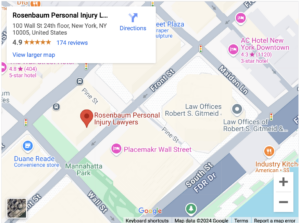Study Reveals Risk Of Misdiagnosis From Questionable Medical Tests
According to a recent FDA study, erroneous medical tests may harm countless patients by causing delayed, missed or incorrect diagnoses.
Misdiagnosis represents a significant threat to patients seeking medical care in New York City. Each year, as many as 12 million Americans, or one in 20 people, receive inaccurate diagnoses in outpatient facilities, according to CBS News. With other care settings included, the number of harmful diagnostic errors is likely even higher. Troublingly, a new study suggests that unreliable and widely used diagnostic tests may contribute significantly to this high rate of errors.
Dangerously flawed diagnostic tests
The Food and Drug Administration recently released a report that highlighted the risk of questionable medical tests resulting in misdiagnoses. According to The New York Times, the report included case studies of tests that are used to diagnose conditions as diverse as cancer, heart disease and autism. The FDA concluded that tests that were inaccurate or poorly designed had potential to cause all of the following issues:
- False positives in healthy patients
- Incorrect diagnoses of legitimate health problems
- Diagnoses that were delayed or missed entirely
The report concluded that a number of the reviewed tests had resulted in serious harm to patients. For example, one test that has been used to detect heart disease in over 150,000 people relied on a scientifically unvalidated assumption. Based on this test, thousands of people may have received unmerited or insufficient treatment with cholesterol-lowering drugs. Another test, which was never proven effective, may have caused healthy women to undergo unnecessary ovary removal procedures.
Unfortunately, the overall number of patients who have suffered harm from these inaccurate tests is unknown, since this data is currently not collected. To address this issue, some lawmakers have urged changes to adverse event reporting guidelines, along with stricter regulation of diagnostic tests.
Improving regulatory oversight
An absence of official regulation of many diagnostic tests may be one factor that contributes to the reported accuracy issues. The FDA has conventionally not exercised close oversight of tests that are produced and used in the same lab. Unfortunately, the impacts of these tests may be widespread, as some of them may be employed throughout the country as definitive diagnostic tests.
Considering this, some lawmakers have called for stricter regulation to ensure that these diagnostic tests are accurate and effective. However, other legislators have expressed fears that excessive oversight could discourage innovation and prevent advances that could benefit patients. Given this ongoing debate, patients may not immediately see changes to the relevant regulations or the accuracy of many diagnostic tests.
Liability for diagnostic errors
In some cases, people who suffer harm due to misdiagnoses may have legal recourse. If a physician makes a diagnostic error that a competent professional should not have reasonably made, he or she may be considered liable. A physician’s failure to account for all of a patient’s symptoms, note potential issues with test accuracy and take other relevant factors into consideration may represent medical negligence or malpractice.
Proving that a diagnostic error constitutes medical malpractice can be difficult, given the subjective nature of the diagnostic process. In New York, people making medical malpractice claims also face the challenge of obtaining a certificate of merit to prove the validity of their claims. Given these issues, people who have suffered harm from diagnostic errors may want to consider speaking to an attorney about preparing a claim and pursuing appropriate recourse.
Contact the New York City Personal Injury Law Firm of Rosenbaum Personal Injury Lawyers for Help Today
If you’ve been injured in an accident in Manhattan, NY, and need legal help, contact our personal injury lawyers at Rosenbaum Personal Injury Lawyers to schedule a free consultation. We also serve in Brooklyn and the Bronx.
Rosenbaum Personal Injury Lawyers – New York City Office
100 Wall St, 24th Floor
New York, NY 10005
(212) 514-5007
Our firm is located near you. We have an office in NYC
Find us with our GeoCoordinates: 40.7051415,-74.0067386
Rosenbaum Personal Injury Lawyers – Bronx Office
1578 Williamsbridge Rd suite 3b
Bronx, NY 10461
(929) 447-2347
Our firm is located near you. We have an office in the Bronx
Find us with our GeoCoordinates: 40.8468944,-73.8483118
Rosenbaum Personal Injury Lawyers – Brooklyn Office
32 Court St #704
Brooklyn, NY 11201
(718) 550-3601
Our firm is located near you. We have an office in Brooklyn
Find us with our GeoCoordinates: 40.692948,-73.991038



